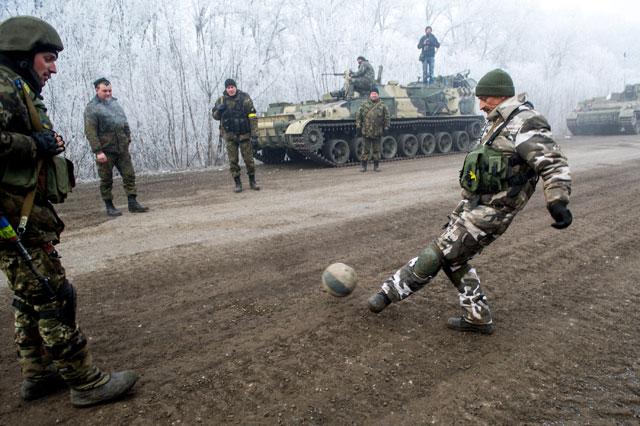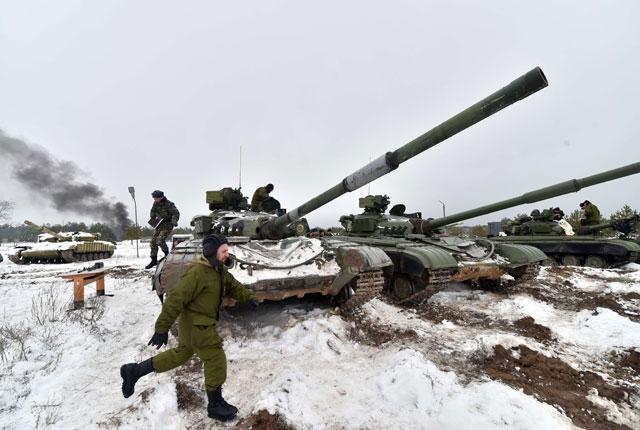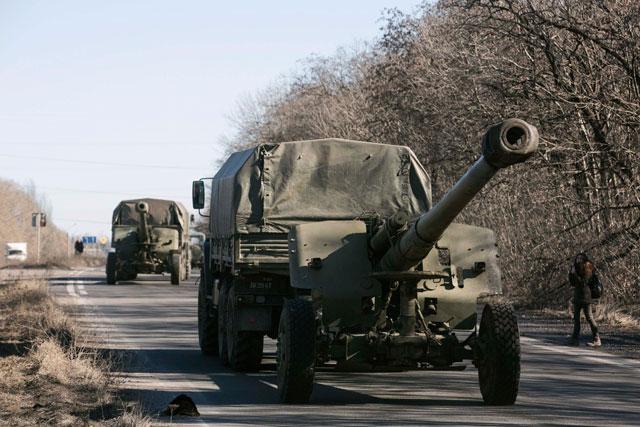You are here
Ukraine truce largely holds despite sporadic shelling
By AFP - Feb 15,2015 - Last updated at Feb 15,2015

YENAKIEVE, Ukraine — Fighting dropped sharply across eastern Ukraine on Sunday but there was still sporadic shelling after a ceasefire came into force, the first step in a fragile peace plan aimed at ending 10 months of conflict.
AFP journalists heard occasional artillery fire coming from the direction of the flashpoint town of Debaltseve, where pro-Russian rebels waged fierce battles to surround Ukranian forces in the hours leading up to the truce.
Elsewhere, pro-Kiev officials said two civilians were killed when shelling hit the town of Popasna in Lugansk region just 20 minutes after the start of the ceasefire at midnight (2200 GMT Saturday).
Ukraine's military said that across the conflict zone its forces had come under fire 10 times but that shooting had tailed off since 3:00am (0100 GMT).
"In general the situation in east Ukraine appears to be heading towards stabilisation," military spokesman Andriy Lysenko said.
The latest deal between Ukraine and the rebels, hammered out in Minsk Thursday after marathon talks involving the leaders of Ukraine, Russia, Germany and France, is seen as the best hope to stop fighting that has killed over 5,480 people since April.
But trust is low on all sides and scepticism remains high after the collapse of a September ceasefire.
The rebels' defence ministry said the truce was being "generally respected" but accused Ukraine of shooting around Debaltseve.
The vital transport hub is seen as the flashpoint most likely to torpedo the ceasefire, with Ukrainian President Petro Poroshenko warning that the truce was "threatened" by the separatist action there.
Rebels have warned that any attempt to move the thousands of government troops they claim to have trapped in Debaltseve will be seen as aggression and draw a response.
Observers from the Organisation for Security and Cooperation in Europe (OSCE) — mandated to monitor the truce — said rebels had blocked access to the town.
The ceasefire was "overall respected" but there had been an exchange of artillery around Debaltseve from around 0800 GMT, the OSCE said.
Deputy Regional Police Chief Ilya Kiva told AFP that shooting in the town and the nearby village of Chornuhine had dropped off but not stopped entirely.
"We hope that it will just take a bit of time before we get a full ceasefire. It is not an immediate process."
In the town of Yenakieve, some 20 kilometres from Debaltseve, a rebel commander called Alexei poured cold water on the truce.
"There is no ceasefire around Debaltseve and their won't be one. Shooting continues," he told AFP.
Ukraine's military said rebels were still trying to occupy Chornuhine and were moving heavy weaponry towards a village close to the key government-held port city of Mariupol.
International pressure
International pressure is high on both sides to stick to the latest deal and prevent an escalation of the worst East-West crisis since the end of the Cold War.
Poroshenko is to speak later Sunday with Russian President Vladimir Putin and the two leaders who helped broker the ceasefire, German Chancellor Angela Merkel and French President Francois Hollande.
US Secretary of State John Kerry spoke by telephone with Russian Foreign Minister Sergei Lavrov to underline "the importance of full implementation" of the ceasefire.
Washington and Kiev accused Moscow of fuelling the last-gasp fighting Saturday by pouring arms across the border to help rebels grab territory. Moscow denied the claims.
Ukraine's military said nine soldiers were killed and 39 were injured in the hours before the ceasefire, while both sides said seven civilians had been killed.
The surge in fighting Saturday had cast doubt on the ceasefire but Putin was said to have reaffirmed his commitment to the deal in a call with Merkel and Hollande.
US President Barack Obama has warned he could start supplying arms to Ukraine if the truce collapses, something Europe is desperate to avoid.
EU foreign affairs chef Federica Mogherini said the bloc could toughen its sanctions against Moscow if the situation deteriorates, describing the truce as a "first step" but not a final resolution.
The UN Security Council is expected to meet in emergency session Sunday to shore up the truce.
Relief but doubts
In Donetsk, residents welcomed the halt in fighting as the sound of constant bombardments died down but remained wary.
"I have trouble believing that the ceasefire will be respected for long," pensioner Andrei, 77, told AFP.
"But even if it lasts a few days, then that isn't bad."
The new Minsk agreement is fraught with potential pitfalls.
Both sides have to begin withdrawing heavy weapons from the front line within two days of the start of the ceasefire to establish a buffer zone between 50 and 140 kilometres wide, depending on the range of the weapons.
Kiev will also begin retaking control over some 400-kilometre stretch of Russia's border with rebel-held Ukraine, but only after local elections are held.
The border is entirely under Russian and rebel control and is used, according to Kiev, as a conduit for separatist supplies.
Separatist-held territories will be granted a degree of autonomy to be established through talks.
Related Articles
Pro-Russian rebels pounded encircled Ukrainian government forces on Monday and Kiev said it would not pull back heavy guns while a truce was being violated, leaving a European-brokered peace deal on the verge of collapse.
Ferocious fighting raged in Ukraine on Saturday, threatening a ceasefire deal as Kiev and the US accused Russia of fuelling a rebel onslaught to grab territory hours before the truce began.
Pro-Russia separatists brought reporters on Tuesday to witness the withdrawal of heavy weapons from the front line in east Ukraine under a ceasefire deal, but Ukraine said the rebels were using the cover of the truce to reinforce for another advance.

















